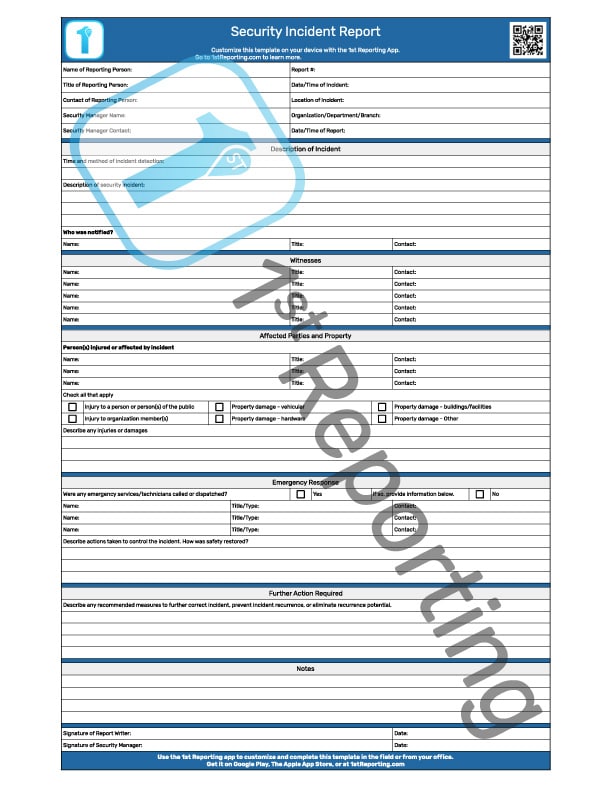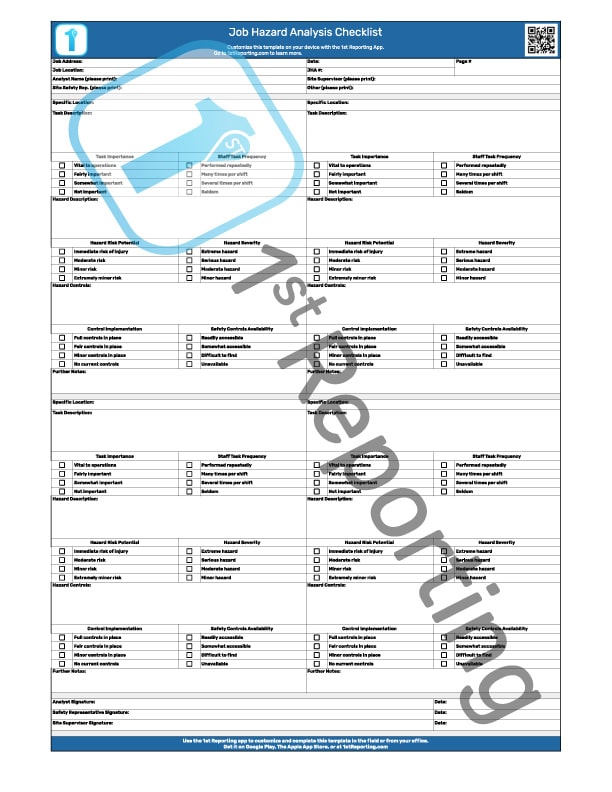This article will address the five critical reasons why completing incident reports within an organization is beneficial to both the organization and its individuals.
Incidents at work happen all the time. A progressive operation documents each and every incident in accordance with the health and safety policy they have implemented. But why should an incident report be completed in the first place? Why not just deal with the situation and move forward? Is there a purpose to all this paperwork?
Incident reports need to be completed by individuals within businesses and organizations for multiple reasons. These reasons include but are not limited to, the following.
- Accident Prevention
- Incident Tracking
- Limiting Liability
- Preventing Operational Breakdowns
- Increases Awareness
We’re going to examine each of these five beneficiary pillars of the incident reporting process. Each pillar will explain why you and your organization would be better off implementing a complete and proactive incident reporting system.
Why Complete An Incident Report? Here’s Why
1. Accident Prevention
Accident prevention is the primary goal of a health and safety program for any business, no matter the industry. Using incident reports aids in creating effective policies, processes, and procedures to establish hazards and actively prevent incidents. The process of reporting and preventing accidents benefits both the individual and the organization. Let’s take a quick look at each below.
For The Individual
Did you know that in 2019, 5,333 workplace deaths occurred in the United States? That’s 2% higher than in 2018, and it shows a disturbing trend. (source)
Individuals are always best attempting to aid in accident prevention at work. So, do your part by filling out an incident report, whether a Near Miss or an event where an injury occurred. Remember that reporting a Dangerous Situation can help prevent it from becoming a serious injury or worse.
For The Organization
When an organization faces its first fine for an accident, it knows that the financial cost can be high. But even if a company reports accidents properly, there are many situations where an increase in insurance rates is imminent due to an accident in the workplace.
Whether you’re dealing with a claim through WCB (New York), CNESST (Quebec), WSIB (Ontario), or somewhere else, each state, province, or territory typically has its own reporting authority. And there are both deadlines for reporting accidents as well as fines for not reporting or attempting to cover up an at-work accident. Therefore, it is always in the best interest of an organization to ensure that all accidents are reported internally so management can determine if governmental agency reporting is required.
2. Incident Tracking
As mentioned above, tracking incidents is an integral step in the reporting process if you are going to attempt to prevent accidents. Tracking incidents is beneficial for both the individual and the organization. Let’s take a look at how.
For The Individual
A robust incident-tracking process benefits individuals within organizations in two primary ways. The first is the aforementioned accident prevention. No one wants to get hurt, so prevention is the primary benefit that individuals receive by incident tracking. The second is the benefit of a safer workplace with the peace of mind of knowing that everyone is looking out for everyone else’s safety.
For The Organization
Incident tracking is a primary means for organizations to mitigate disasters by preventing accidents, equipment and property damage, and more. Using a seamless digital reporting app like 1st Incident Reporting or another less feature-packed system to track your company’s reportable incidents is essential for limiting liability and expenses related to incidents.

Image by Gerd Altmann from Pixabay
3. Limiting Liability
Liability is a huge issue in our modern world. Lawyers are seemingly on every corner, eagerly awaiting a person or company to slip up. And there are those out there who prey upon people and companies to find opportunities for litigation.
For The Individual
In any situation, whether an incident like an employee injury or a potential accident from equipment malfunction, the last thing anyone needs is to be held accountable for injuring someone else. Did you know that if you manage anyone at all in the workplace, you could be liable if they are injured at work?
In management or supervisory roles, we are each liable for the health and safety of those who work with us under our supervision. Due to this simple fact, it is imperative that individuals take incident reporting seriously, if for, at the very least, merely to limit their own personal liability.
For The Organization
The benefits to a business limiting its liability are obvious. With over $100 billion each year in litigation losses for small businesses in the US, it’s no wonder liability is on everyone’s mind. (source)
Limiting a company’s exposure to risk, both financial and otherwise, is essential to maintaining lower costs of operations. Fines and industry blackmarks aside, poor reporting practices do nothing to limit liability and often cost companies many times more than following regulations would have in the first place. Consider the increases to standard insurance rates for an employer should the employer be found negligent when it comes to following regulatory reporting practices.
4. Preventing Operational Breakdowns
Incidents that cause operational disturbances slow everyone down. Sure, if you’re a worker and you want a day off, then your work shutting down for the day isn’t such a bad thing. But what if you really need the money and the company has to close permanently? It’s easy to understand how operational business can affect both individuals and businesses alike. Let’s go a bit more into detail.
For The Individual
Most of the time, individuals who face operational breakdowns at work are happy for a break. However, what affects a company’s bottom line will inevitably affect each individual in the company. Whether it’s less opportunity for advancement, lower bonuses, or even as far as lay-offs, everyone feels the pinch eventually. If employees play their part in the incident reporting process, further costly operational breakdowns can be prevented.
For the individuals in management, you can relate to how a team-oriented workforce is far more beneficial to your operations than a rebellious workforce. Those staff who are ‘company men and women’ make the jobs of management easier by aiding in reporting potential incidents pre-emptively. When equipment fatigue is noticed by prospective personnel, equipment failure can be mitigated with preventive maintenance action. It is only plausible with a vibrant incident reporting system in place.
For The Organization
As mentioned for the individuals in management, the organization itself also obviously benefits from a positive reporting system. From saving on preventable expenses from incidents to increasing the safety of staff and clients alike, there are supremely more benefits for an organization to complete incident reports than there are liabilities.
Learn more about The Incident Report And Disclosure Process here.
5. Increases Awareness
Finally, we’ll discuss why an incident report should be completed. The process increases awareness, and here’s how it affects the individual and the organization.
For The Individual
Increased personal awareness for all individuals involved in or around an incident is vital to prevent further or repeated injury or damage to people or property. Here, we can see the imminent importance of completing an incident report and how it can impact the lives of those around.
Preemptive behavior to avoid injury or incident only occurs when we know of a potential hazard. Incident reporting is a primary means for individuals to communicate to others in the workplace that there is a potential danger that requires attention.
For The Organization
Increasing awareness by completing incident reports within an organization is beneficial for two reasons. First, it helps prevent incidents from occurring in the first place, which saves an organization from costly incidents and downtime. The second benefit for the organization is the effect on the organization’s overall appearance and brand within the community. Any business known to care about the safety of its workers is a business that will attract positive and productive staff. A more vital workforce makes a business more robust. So, in the end, good incident reporting really is a win-win.
Taking Incident Reporting To The Next Level
If you’re looking to save even more time and money and make your incident reporting more efficient, consider a digital reporting solution.
1st Incident Reporting is the specialist in all things incident reporting. The app allows your company to take control of your incident report process with detailed reports, instant notifications, instant report online access, and more. Want to learn more?
Sources
- Featured Image by Evelina Zhu from Pexels
- https://www.bls.gov/iif/#:~:text=A%20total%20of%205%2C333%20workers,the%20rate%20reported%20in%202018.
- https://money.usnews.com/careers/articles/workplace-laws-your-employer-may-be-violating
- https://www.businessnewsdaily.com/15204-common-business-lawsuits.html



